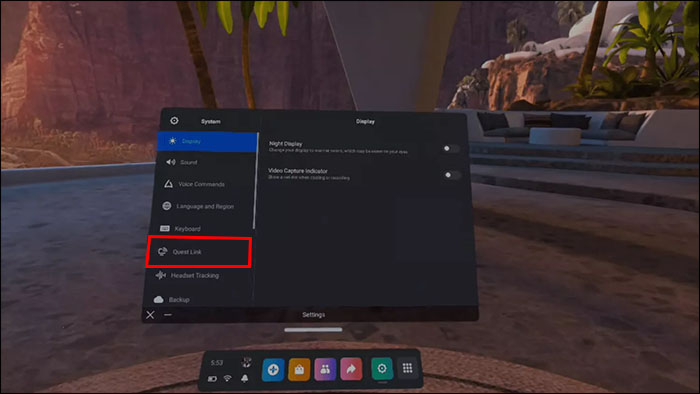The Oculus Quest 2 (or Meta Quest 2) isn’t just a standalone VR headset. Users can cast it on their TVs for spectator mode and connect it to their PCs with a link cable. This makes the Oculus Quest 2 perfect for developers who want their app to be available across platforms. Gamers can also opt for a wireless connection using Air Link.
This article will show you how to use a link cable with the Oculus Quest 2 across platforms.
How to Use a Link Cable with the Meta Quest 2 for PC
The Quest link cable is a high-quality USB-C-to-USB-C cable specialized for Oculus Quest 2 sharing between the headset and a PC. Most Oculus Quest 2 sets come with a cable, but users can also find other compatible cables from third parties.
The main difference between a Quest Link cable and an ordinary one is that the former provides greater freedom because of its length and also ensures a strong and stable internet connection. The headset port is also on the side, keeping the cable out of the way.
However, if your PC doesn’t have a USB-C port, you’ll need a USB-C-to-USB-A cable, a USB-C adapter, or a USB-C hub.
You’ll also need to download the Oculus Quest 2 software to use the link cable. Here’s how to connect the two devices:
- Locate the USB-C port on your Oculus Quest 2 headset and plug in the Link Cable.

- Plug the other end on your PC’s USB-C port or hub.

- Turn on your Oculus Quest 2 and enter the Oculus app.

- Follow the on-screen instructions to enable the link.
Once the two devices are connected, the app will allow you to browse and purchase games unavailable while just on the headset. You can play these VR games while connected to the PC and also enter developer mode.
How to Use Air Link With the Oculus Quest 2 for Wireless Connection
Using a link cable is easy but doesn’t allow players to move around freely to play their favorite VR games. Despite being longer than standard USB cables, the link cable can still be a limiting factor when attempting an immersive VR experience. Fortunately, the Oculus Quest 2 allows for wireless cross-platform integration through Air Link. You’ll want to make sure your headset is fully charged because the connection can excessively drain the battery.
Here’s how to connect your Quest 2 VR headset to your PC using the Air Link option:
- Open the Oculus Quest 2 app on your PC. You can download the app from Meta Quest’s setup page.

- Find the “Add a headset” option before clicking on the “air link” connection method.

- Use your headset to access the “settings” option on the universal menu.

- Select the “System” option and then move to “Quest Link.”

- Select “Launch Quest Link” and then toggle the air link to on.
- You’ll see your PC appear on the menu. Select the “Pair” option before following the on-screen instructions.

Some people find the Air Link option inconvenient because it requires pairing through the settings menu. At the same time, a link cable is almost only a matter of plugging in the two devices. However, Air Link is better if a game requires you to move around freely.
How to Use Your Oculus Quest 2 While Connected to a PC
There are several benefits users can gain once the Oculus Quest 2 is connected to a PC. The headset can handle various games, but the PC gives it additional power. Players might notice better graphics, smoother gameplay, and an overall more immersive experience. This extends the pool of playable games and makes Quest 2 compatible with certain VR games on Steam.
Here’s how you can set up custom graphic settings to ensure the best gaming experience:
- Open up the app for your Oculus on the PC while the two devices are connected.
- Select the “devices” option, which is located in the far left menu.
- Click on the Oculus Quest 2 and then the advanced graphic preferences option.
- You can customize different graphic options, such as frame rates.
- Restart the Oculus Quest 2, and the new graphic setting should be automatically adjusted.
Users should set the frame rate to 90 Hz while testing other settings, such as rendering resolution. The system also supports purchased Steam games that are compatible with VR. Once launched, the game will offer an option of playing in VR or regular mode. It will also be easier to purchase Oculus games while having the app opened up rather than doing so on the headset.
How to Update the Oculus Quest 2 App
In certain instances, users may encounter problems connecting their Quest 2 with the PC. Unless your link cable is damaged, it’s most likely an update issue.
Here’s how to ensure the PC’s Oculus Quest 2 app is fully updated:
- Open Oculus Quest 2 computer app.
- From the main left menu, select “Library.
- Click on “Updates.” The on-screen instructions will inform you if an update is available.
- Select “Update” for the latest version.
Depending on your last update, the process might take several minutes. However, you’ll also want to ensure your headset is updated. Here’s how to do so:
- Turn on your Quest 2 and enter the universal menu (via the button on the right controller with the logo).
- On the menu, select “settings.”
- Then select “Our Quest” and then “More Settings.”
- Select “Advanced Settings” and then “Turn on updates.”
Once you turn on updates, the Oculus Quest 2 will automatically start downloading the necessary files. Make sure to have a full battery and a stable internet connection.
How to Fix PC Connection Issues With the Oculus Quest 2
Since Link cables for the Oculus Quest 2 are specialized, it’s rare that you’ll run into any issues for connecting. However, sometimes standard PC settings can stop the connection from establishing properly. Fortunately, there are a few things you can do to solve the issue. Before addressing potential setting issues, there are additional things to consider, such as:
- Ensure the Air Link is set to off. The Air link can interfere with the connection using a Link Cable.
- Check to see if your Quest 2 headset is updated.
- Fully charge your headset before attempting to connect with a Linked Cable.
- Consider restarting the Oculus Quest 2 as rebooting the system can frequently take care of minor technical issues.
- Make sure to click on “Allow” when the USB notification appears on your PC.
By using the strategies above, you’ll be able to fix the connection issue and the Link Cable will work optimally.
FAQs
Can I connect my Oculus Quest 2 with my TV?
Users can cast the Oculus Quest 2 on their TV, not just the PC. However, this process requires a direct connection between the two devices or the mobile app.
Can I connect an Oculus Quest 2 to a PC with a USB cable?
Meta recommends using the provided Link Cable to connect your headset to a PC. However, third-party USB cables might also work. Newer USB cables might mention Oculus or Meta Quest compatibility on the box.
Is Air Link a feature that costs more to use with the Oculus Quest 2?
No, the Air Link is a free feature on every Oculus Quest 2 headset.
Cross-Platform Integration with Your Oculus Quest 2
The Oculus Quest 2 is compatible with multiple devices. Users can connect to their PC using a Link cable or Air Link for more mobility. This will allow you to play games unavailable on the headset and even run Steam games with the VR platform. It also gives users the option to upgrade game graphics for the best virtual reality experience.
Did you find it easy to connect your Quest 2 to your PC via link cable? Do you prefer using Air Link as a wireless option? Let us know in the comment section below.
Disclaimer: Some pages on this site may include an affiliate link. This does not effect our editorial in any way.


















